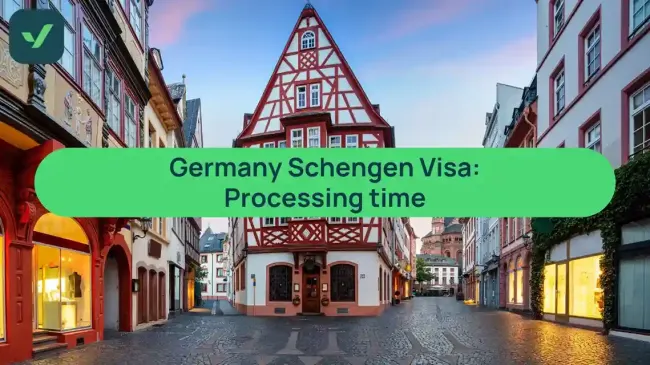
Study in Germany: Apply Now for the Germany Student Visa
What you need to know
Eligibility requirements
Acceptance to a recognized university or college in Germany: You must have been accepted into a recognized university or college in Germany before you can apply for a student visa. You will need to provide documentation of your acceptance or enrollment.
Sufficient financial means: You must demonstrate that you have sufficient financial resources to support yourself during your studies in Germany. This may include bank statements, proof of scholarships or grants, or a formal declaration of financial support from a sponsor.
Health insurance: You must have valid health insurance that covers you for the duration of your stay in Germany. This may be obtained through a German health insurance provider or a provider in your home country.
Proficiency in the German language: Depending on the program you are enrolled in, you may need to demonstrate a certain level of proficiency in the German language. If the program is taught entirely in English, you may not need to demonstrate proficiency in German.
Clean criminal record: You must have a clean criminal record and provide a police clearance certificate from your home country.
Academic qualifications: You must provide evidence of your academic qualifications, including transcripts and diplomas.
Other specific requirements: Depending on your country of origin, you may be required to provide additional documentation or meet other specific requirements, such as undergoing a medical examination or obtaining a visa interview."
Steps to apply
-
Prepare required documents: You will need to gather all the necessary documents required for your visa application. These typically include your passport, acceptance letter from a German university, proof of financial means, health insurance, and other supporting documents.
-
Schedule an appointment: You will need to schedule an appointment at the German embassy or consulate in your home country to submit your visa application. The appointment may need to be scheduled several weeks or even months in advance, so it's important to plan ahead.
-
Submit your application: At your scheduled appointment, you will need to submit your visa application and all supporting documents. You may also need to pay a fee.
-
Wait for processing: After you submit your application, it will be reviewed by the embassy or consulate. The processing time can vary depending on your individual circumstances, but it can take several weeks or even months.
-
Attend an interview: Depending on your individual circumstances, you may be required to attend an interview as part of the visa application process.
-
Receive your visa: If your visa application is approved, you will receive your visa in your passport. Be sure to check the visa to ensure that all the information is correct and that the dates are accurate."

What is the German Student Visa?
The German student visa is a type of visa that allows international students to study and live in Germany for a certain period of time. It is also known as a "student residence permit" or "student visa for study purposes."
What Can I Do With a German Student Visa?
With a German student visa, you are allowed to:
-
Study: The primary purpose of a student visa is to allow you to study in Germany. You can attend lectures, participate in classes, and take part in other academic activities.
-
Work part-time: International students are allowed to work part-time in Germany, usually up to 120 full days or 240 half days per year. This can help you support yourself financially while studying.
-
Travel within the Schengen area: With a Germany student visa, you can travel freely within the Schengen area for up to 90 days in a 180-day period.
What Can't I Do With a German Student Visa?
There are also some things that you cannot do with a student visa:
-
Work full-time: While you are allowed to work part-time, you are not allowed to work full-time with a student visa.
-
Extend your stay for non-academic reasons: Once your studies are complete, you cannot extend your stay in Germany for non-academic reasons, such as to look for work or start a business.
-
Stay in Germany indefinitely: The student visa is valid only for the duration of your studies, so you cannot stay in Germany indefinitely without obtaining a different type of visa or residency permit.
Who can apply for a German Student Visa?
International students who meet certain criteria can apply for a Germany student visa. To be eligible for the visa, you must:
-
Be accepted to a recognized university or college in Germany: You must have proof of enrollment or acceptance to a program in Germany before you can apply for a student visa.
-
Have sufficient financial resources: You must be able to show that you have enough money to support yourself during your studies in Germany. This may include bank statements, scholarships, or other forms of financial support.
-
Have health insurance: You must have health insurance that is valid in Germany for the duration of your stay.
-
Meet the language requirements: You may need to demonstrate proficiency in German, depending on the program requirements you are enrolled in.
-
Meet any other specific requirements: Depending on your country of origin and the program you are enrolled in, you may be required to meet additional requirements, such as undergoing a medical examination or providing a police clearance certificate.
Can Minors Apply for a German Study Visa?
Minors who wish to study in Germany will also need to apply for a student visa, but there are some additional requirements and considerations for underage applicants.
If the minor is under the age of 16, their parents or legal guardians must apply for the visa on their behalf. If the minor is between the ages of 16 and 18, they may be able to apply on their own, but they will still need to provide proof of parental consent.
In addition, minors may need to provide additional documentation to show that they have adequate accommodation and supervision during their stay in Germany. This could include a letter of invitation from a host family or documentation of arrangements made with a student residence or other accommodation.
The minor may also need to provide additional documentation to show that they have sufficient financial resources to support themselves during their studies in Germany.
Finally, minors may need to provide additional documentation to show that they are enrolled in an appropriate academic program and that they meet any language or other requirements for the program.
Overall, the application process for a Germany student visa for minors can be more complex than for adult applicants, so it's important to begin the process well in advance of the planned departure date.
Visa Exempt: Who Doesn't Need to Apply for this Document?
Citizens of countries within the European Union (EU), the European Economic Area (EEA), and Switzerland are not required to obtain a visa to study in Germany. This includes nationals of countries such as Austria, Belgium, Denmark, France, Italy, Netherlands, Spain, Sweden, and many others.
However, even if you are a citizen of an EU or EEA country, you may still be required to register with the local authorities once you arrive in Germany to begin your studies.
In addition, citizens of certain other countries may be eligible for visa-free travel to Germany for short-term stays of up to 90 days. This includes nationals of countries such as the United States, Canada, Japan, and Australia.
However, if you plan to study in Germany for over 90 days, you must obtain a student visa. Even citizens of visa-exempt countries are required to obtain a visa if they plan to study in Germany for an extended period of time.
Germany Student Visa Certified customer reviews
Filter by rating
How to Apply: Student Visa
Complete our user-friendly online application in just 20 minutes, or feel free to take breaks and return at your convenience.
Move closer to an approved visa with our team of iVisa Experts, who not only review your answers but also provide you with the necessary tools to prepare.
Make use of our feedback and free templates to confidently submit accurate information, and experience a surprisingly stress-free process!
Once government-approved, your visa will be ready for collection, marking the start of your travels.
How to Apply: Embassy Registration
Complete our easy online application and pay with credit card or PayPal
Your embassy will assist you if an emergency (eg. Natural disasters, civil unrest, etc) occur
Why Register with the Embassy
Required Information to Apply
Once You Have Registered With Your Embassy Or Consulate, You Will Need To Update Your Data If:
- your contact details change,
- your civil status changes,
- you are going back to your home country.

 Australia ETA Online
Australia ETA Online
 United Kingdom ETA
United Kingdom ETA
 India Tourist eVisa
India Tourist eVisa
 Canada ETA Visa
Canada ETA Visa
 Turkey eVisa
Turkey eVisa
 Egypt eVisa
Egypt eVisa
 Singapore SG Arrival Card
Singapore SG Arrival Card
 Indonesia eVoa Visa
Indonesia eVoa Visa
 Aruba ED Card
Aruba ED Card


